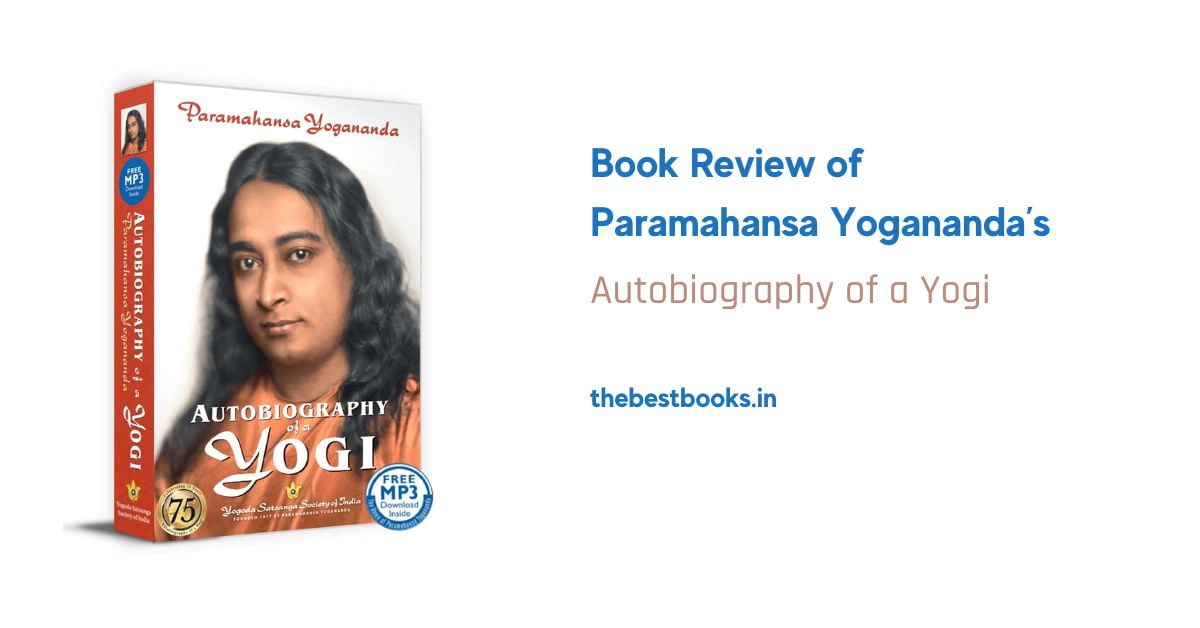Autobiography of a Yogi by Paramahansa Yogananda Book Review
“Autobiography of a Yogi” by Paramahansa Yogananda, published in 1946, is a landmark in spiritual literature, profoundly shaping global discussions on spirituality and mystical experiences. The book chronicles Yogananda’s life journey, encounters with saints and sages, and his introduction of Kriya Yoga to the Western world. It bridges Eastern and Western spiritual traditions through vivid narratives and profound philosophical insights, emphasising the universality of spiritual truths. Celebrated for its accessible yet profound exploration of meditation, self-realisation, and divine experiences, the autobiography has inspired millions, including influential figures like Steve Jobs. Its widespread translation and enduring popularity underscore its pivotal role in fostering a deeper understanding of spiritual practices and consciousness, making it a cornerstone text for spiritual seekers worldwide.

Overview and Structure:
“Autobiography of a Yogi” is meticulously structured to provide readers with a coherent and immersive experience of Paramahansa Yogananda’s remarkable life. The book is organised chronologically, beginning with Yogananda’s early years in Gorakhpur, India, and culminating in his establishment of the Self-Realisation Fellowship in the United States. This chronological framework allows readers to witness the evolution of Yogananda’s spiritual journey, offering insights into his development from a spiritually curious child to a revered spiritual leader.
Childhood and Early Influences:
The autobiography’s initial chapters delve into Yogananda’s childhood and early influences. These sections vividly portray his family life and highlight the spiritual atmosphere that pervaded his upbringing. Yogananda’s fascination with saints and early mystical experiences are recounted with wonder and reverence. These formative years set the stage for his later spiritual quest, emphasising the innate spiritual inclinations that would define his life.
Spiritual Quest and Guru-Disciple Relationship:
Much of the book is dedicated to Yogananda’s spiritual quest and deepening relationship with his guru, Swami Sri Yukteswar. The narrative details his relentless pursuit of spiritual knowledge, his rigorous training under Sri Yukteswar, and the transformative experiences that shaped his understanding of Kriya Yoga. The guru-disciple relationship is portrayed with great depth, illustrating the profound bond and the transmission of wisdom from master to disciple. These chapters have philosophical insights and practical guidance on meditation and spiritual practices.
Encounters with Saints and Sages:
Throughout the autobiography, Yogananda recounts his encounters with various saints and sages, each chapter dedicated to a different figure who influenced his spiritual path. These include renowned personalities such as Lahiri Mahasaya, Mahatma Gandhi, and Anandamayi Ma. Each encounter is described with vivid detail, capturing the essence of their spiritual presence and the lessons imparted. These narratives not only enhance the richness of the autobiography but also underscore the diversity and depth of India’s spiritual heritage.
Journey to the West and the Spread of Kriya Yoga:
A pivotal section of the book details Yogananda’s journey to the West and his efforts to introduce and establish Kriya Yoga in America. This part of the narrative highlights the challenges and triumphs he faced as a cultural ambassador of Eastern spirituality. Yogananda’s lectures, public appearances, and the founding of the Self-Realization Fellowship are chronicled with an emphasis on his mission to bridge Eastern and Western spiritual traditions. His interactions with Western thinkers and the reception of his teachings provide valuable insights into the cross-cultural exchange of spiritual ideas.
Philosophical Reflections and Mystical Experiences:
Yogananda’s philosophical reflections and accounts of mystical experiences are interspersed throughout the autobiography. These sections offer readers profound insights into the nature of consciousness, the purpose of life, and the practices of Kriya Yoga. Yogananda’s ability to articulate complex spiritual concepts relatable and engagingly is one of the book’s strengths. His descriptions of mystical experiences, such as out-of-body journeys and divine visions, are presented with sincerity and depth, inviting readers to explore the possibilities of higher states of consciousness.
Legacy and Impact:
The concluding chapters of the autobiography reflect on Yogananda’s legacy and the enduring impact of his teachings. They highlight the establishment of the Self-Realisation Fellowship and its role in disseminating his spiritual message worldwide. Yogananda’s vision of a universal spirituality transcending religious boundaries is a recurring theme, emphasising his teachings’ inclusive and universal nature.
All these indeed suggest that “Autobiography of a Yogi” is a richly textured narrative that offers a detailed and intimate look into the life of one of the most influential spiritual figures of the 20th century. Its structured approach and comprehensive coverage of Yogananda’s life and teachings make it an essential read for anyone interested in spirituality, meditation, and the intersection of Eastern and Western spiritual traditions.
Themes and Content:
A central theme of the autobiography is the quest for spiritual enlightenment. Yogananda’s narrative is marked by his unwavering dedication to this pursuit, starting from his early fascination with saints and his eventual initiation into Kriya Yoga by his guru, Sri Yukteswar. The book delves into the principles of this ancient meditation technique, explaining its transformative potential and its role in achieving self-realisation.
The autobiography is replete with accounts of mystical experiences and miracles, illustrating the depth of Yogananda’s spiritual insights. These include out-of-body experiences, encounters with divine beings, and the ability to perform supernatural feats. While these accounts may challenge the sceptical reader, they are presented with sincerity and conviction that compel one to consider the possibility of higher states of consciousness.
One of the most compelling aspects of “Autobiography of a Yogi” is its bridging of Eastern and Western spiritual traditions. Yogananda’s journey to America and his efforts to disseminate the teachings of Kriya Yoga to a Western audience highlight his role as a cultural ambassador. His narrative emphasises the universal nature of spiritual truths, transcending cultural and religious boundaries.
Literary Style and Impact:
Yogananda’s writing style is both lyrical and accessible, blending vivid descriptions with profound philosophical reflections. His ability to convey complex spiritual concepts in a relatable manner has contributed to the book’s enduring popularity. The narrative is imbued with humility and devotion, reflecting Yogananda’s genuine passion for sharing his spiritual experiences.
“Autobiography of a Yogi” has significantly impacted both spiritual seekers and the broader literary community. It has been translated into numerous languages and has inspired countless individuals to explore meditation and yoga. Notable figures such as Steve Jobs and George Harrison have cited the book as a significant influence on their lives.
Conclusion:
“Autobiography of a Yogi” is more than just a personal memoir; it is a spiritual guidebook that offers readers a glimpse into the profound possibilities of human consciousness. Paramahansa Yogananda’s life story is an inspiring testament to the power of dedication, faith, and the pursuit of higher truths. Whether one approaches the book as a sceptic or a believer, it provides valuable insights into the nature of spirituality and the potential for personal transformation.
Get a copy of this acclaimed book from Amazon India – click here.
Are you interested in reading spiritual books? You will like this article too – Best spiritual authors and books.
Review by Avinash for Desi Readers
